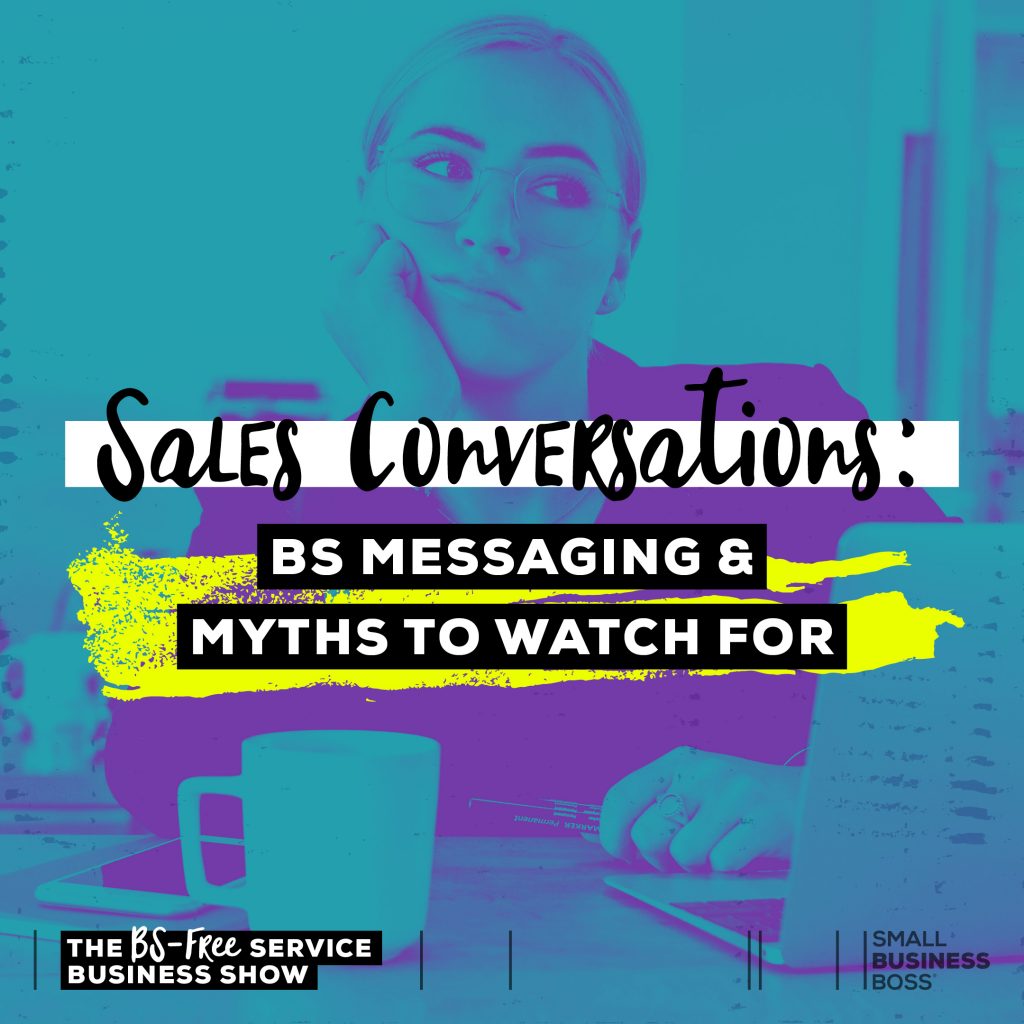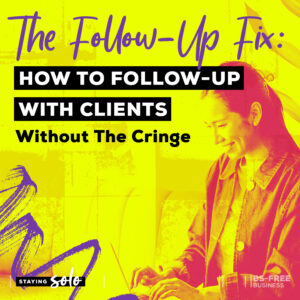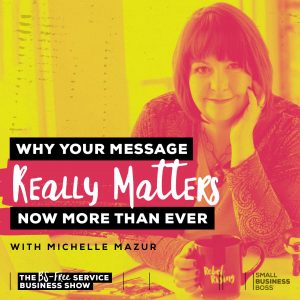
Search the site:
Sales Conversations: BS Messaging & Sales Myths to Watch For
Have you ever thought to yourself, “ugh, I’m bad at sales” or wondered if you were missing something in the sales process? If you have, that’s going to stop today as we break down BS sales myths and messages about sales calls and talk through some specific ways to make those calls that much simpler.
Sales are a big part of our business, as our ability to make sales is directly tied to our ability to make a living.
So it’s not surprising that there’s a never-ending stream of courses and programs and stories, and well, everything, around sales strategies and tactics.
That’s nothing new. But the current narrative is confusing and full of contradictions. Some days I find myself hearing these things and wondering if I’m weird because I don’t get it.
Two of the most confounding messages to me have been around not doing sales calls at all, and the idea that I need to use sales psychology in order to close the sale.
I’m sure you’ve noticed these things too, and if you’re not confident about your sales skills, you’re likely wondering if you’re missing something. Maybe you think you’re wrong for doing sales calls or that you need stronger skills.
Frankly, it’s BS. And in this episode, I want to dispel some of these sales myths and get you thinking about your sales calls differently.
Sales Calls Can Be Simple
First, let’s tackle this trend around “not doing sales calls” that villainizes the process of spending time talking to potential customers.
Honestly, I’ve got to wonder what’s going on with people pushing this narrative that they hate sales calls so much. It’s clear to me that they were doing sales calls in a way that was unsustainable and lacking structure.
Here are a few ways I see to make sales calls much, much simpler, and to structure them so they’re not a waste of time.
Pre-Qualify Leads for Budget Fit
First, they’re talking to the wrong people. That’s why you need to do a better job of screening potential clients for fit. Maybe that’s a short but impactful application or a bit of back/forth on email or social media, but you shouldn’t be getting on a call with everyone and anyone.
Speaking of applications, if you’re not setting pricing expectations before a call (or making people get on the call to get an idea of pricing), you’re doing yourself a disservice.
People booking a call with you who don’t have any concept of price aren’t qualified leads. They’re coming in cold, and you’re apt to end up with tire kickers wasting your time.
Price is a qualifier for people. Budgets are real and when there’s a mismatch, I don’t care how good you are as a salesperson, you’re wasting your time.
The idea that you know better than your potential client and can coach them “through their objections” is a sleazy sales myth from years of toxic online business practices.
Call Parameters and Purpose
First, you need to be very clear about what the purpose for the call is with your prospective client, and what the parameters around it are.
As an industry, we use consult calls and “discovery” calls interchangeably as two very different things. If we’re getting on a call or Zoom to chat with someone about working together, we need to be CLEAR that the point of the call is about paid work. It’s not a free strategy session or designed for free coaching.
Speaking of which, I keep getting ads where people offer up free “strategy” calls where the ad leads to a scheduler. As a business owner, this is a terrible practice as you’re not providing any context for what the potential offer is and you’re calling in people who want free advice.
As a consumer, I urge you not to bother with these offers, even if they’re free, as you’re going to be on the receiving end of a major sales pitch. Nothing good is going to come from that free call, as believe me, there’s going to be nothing, and I mean nothing free about it. This is an offer with an agenda, not someone who’s simply being helpful.
Sales Calls Sucking Up Precious Time
Another complaint I get is about sales calls being super long. I get it, you’ve got limited time in your days, and no one wants to spend their days talking to people who aren’t likely to turn into paying clients.
This is a pretty common structural issue, and you need to set up your sales calls so there’s a clear container. When you go into a sales conversation with a clear process and the client has an understanding of what the call is about, it’s easier to rein in it.
Many times as service business owners we have this idea that we need to let potential clients run the show. This is yet another of the sales myths. You’ll get more respect and credibility by taking control of your consult calls.
Otherwise, you’ll find yourself giving away 45 minutes or an hour of advice or giving away strategies that people should be paying for.
The key is an approach where:
- You’re screening people into a conversation about actually working together
- You’ve set budget expectations and they’re aligned with the potential client
- You’re setting the agenda for the conservation
Rethinking Your Sales Calls
If you struggle with sales calls or don’t like them, I want you to think about how you can make them work better for you. Especially as this is a big place I see sales myths showing up!
Over the course of my career, I’ve spent a lot of time refining my approach to sales conversations, so I want you to know they can be a hell of a lot simpler and much more sustainable than the current narrative would have you believe.
You don’t need an advanced degree in sales psychology in order to be “good” at sales calls. You don’t need sales hacks or persuasion strategies. You just need to be willing to show up and have a conversation.
One thing I’ve learned on a personal level is that sales calls are incredibly valuable for you as a business owner once you get your process nailed down. For example, a few months ago I was feeling creatively blocked about what to talk about on the podcast, and after doing sales calls for the BS-Free Mastermind, I was excited and inspired.
For the introverts here, I get it. Sales calls require energy and it can be exhausting to show up in this way. That said, when you do a good job of pre-screening, it’s way less taxing as you have a better idea of what you’re going into, and your call is less likely to go from a 15-minute chat to an hour-long strategy session.
Should You Really Skip Sales Calls?
Finally, if you’re not convinced, I want you to question if your service is something that people would buy without talking to you.
I get that it’s trendy and/or tempting to shift away from sales calls, but to do that well, you need systems to pull it off. If you’re not on sales calls, how are people getting information on your service? How are they asking questions?
Most of all, how are you ensuring there’s a strong mutual fit? I recently saw someone talking about selling their service in the DMs, and I had a visceral reaction.
For me, there’s a degree of mutual safety that comes from a sales conversation where I can assess if someone is a good fit and vice-versa. I work closely with my clients, and I get anxious about having to interact with someone I have zero experience with.
Honestly, No DM or application would ever tell me what I can figure out about someone in a matter of minutes on Zoom.
Finally, consider this. While the “no sales calls” approach may work for a program or a course, for a service, it’s a harder sell for potential clients with services as there’s typically a one-to-one element.
I personally would never buy a service over a certain price point without a conversation. Someone who’s not willing to take 15 minutes to chat with me is a red flag, and I’m willing to bet your potential clients may be the same.
Beware these Sales Myths and Revamp Your Consult Calls
In short, don’t fall for these messages and sales myths about your consult calls. It’s so easy when you hear these things to fall into the trap of thinking maybe you’re doing sales calls wrong, or that you shouldn’t do them at all.
With a simple strategy around your sales calls, you’ll be well equipped to show up and have conversations with potential clients. No sales psychology or fancy funnels needed.

I’m Maggie Patterson (she/her), and services businesses are my business.
I have 20+ years of experience with client services, am a consultant for agency owners, creatives, and consultants, and vocal advocate for humane business practices rooted in empathy, respect, and trust.
Read or Listen to the Latest
For Solo Business Owners

Growing a solo service business is tough.
It’s even harder when you’re bombarded with BS advice that steers you away from your values and why you started your business in the first place.
This is the podcast for solo creatives and consultants who want to remain as a team of one and have zero interest in the hustle and grind of typical business teachings.
Subscribe now and never miss an episode.
For Micro Agency Owners
Most podcasts for agency owners obsess over revenue growth as the ultimate success metric.

But here’s the truth: not everyone wants to make millions. Your goal might be to build a sustainable business that lets you have a life and doesn’t run you into the ground.
Join me as I spill my shameless confessions and share everything I’ve learned about building a micro agency that skips the BS of tired and typical agency teachings.
Follow Now on All Major Podcast Platforms








